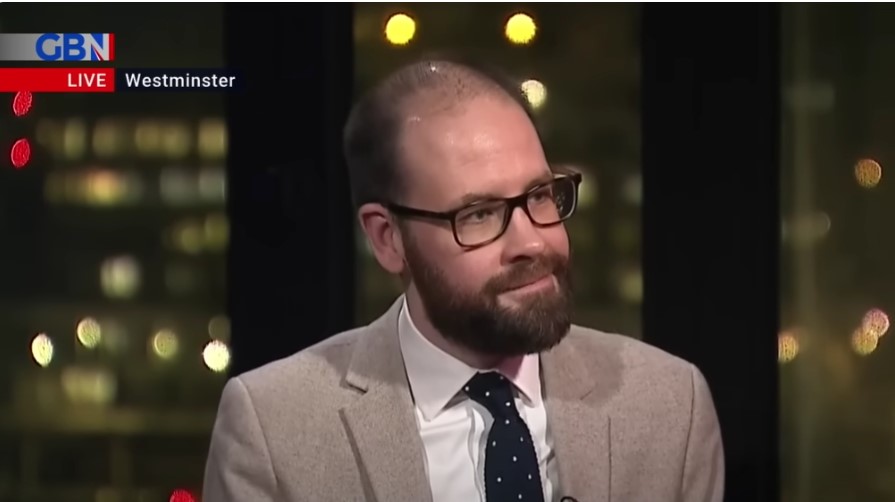This investigation was published in partnership with The Bureau of Investigative Journalism.
The anti-solar group Save our Shire has hired a PR firm run by Alex Crowley, a former Boris Johnson advisor who has previously helped manage fake grassroots political campaigns.
The proposed Roundhill Solar Farm in Wychavon, Worcestershire, is one of a large number of British renewable energy projects to have met with opposition, as the urgency of decarbonising the UK’s electricity clashes with local desires to protect rural landscapes from development.
A huge expansion of solar is needed to meet the UK government’s target of net-zero emissions by 2050. The application by JBM Solar, which is owned by German energy giant RWE, says it will provide electricity for 18,000 homes in the area.
But the Save the Shire opposition campaign argues that the 287-acre solar farm will destroy countryside that is said to have inspired Lord of the Rings author J.R.R. Tolkien.
On its website, the campaign describes itself as “a group of local people campaigning to protect an historic part of Worcestershire which is under threat”. It is part of the UK Solar Alliance, a well-organised network of over 100 local anti-solar groups.
However, a new investigation by the Bureau of Investigative Journalism and DeSmog has found that the campaign is run by Londoner Alex Crowley, a communications consultant and former adviser to 10 Downing Street, who has previously managed a fake grassroots Facebook page promoting a no-deal Brexit.
In 2020, soon after leaving government, Crowley co-founded Shared Voice, a communications agency to “create and execute digital campaigns that mobilise public support for your cause, business or policy ask”.
Shared Voice has not publicised the fact that it is working with Save the Shire. An analysis of transparency data, however, found the consultancy was paid upwards of £10,000 to publish Save the Shire’s adverts on Facebook and Instagram. The campaign published 15 ads since the group’s Facebook page was created in February 2023, which were shown approximately two million times to social media users.
The ads focus on the beauty of “Tolkien’s landscape”, describing the solar project as a “huge industrial power station” that would “destroy the British countryside unnecessarily”.
“We are supposed to have transparency over who pays for influence campaigns,” said Peter Geoghehan, author of Democracy for Sale: Dark Money and Dirty Politics.
“But, as this investigation shows, it is still incredibly easy for opaquely funded lobbyists to influence our politics.”
Phil Coathup, chair of Save the Shire campaign, told TBIJ: “This is not a political campaign. We are a local non-partisan action group that are [sic] employing a company called Shared Voice, paid for by our activists, to run some of our communications and ads.
“We are working with all political parties and organisations that support our campaign.”
Misleading Ads
Crowley was a senior adviser on Boris Johnson’s successful leadership campaign in 2019, becoming his political advisor “assisting with the transition from the leadership campaign to government”. He was awarded an OBE in Johnson’s 2023 resignation honours.
Prior to that, he was a political director on Zac Goldsmith’s failed mayoral bid, and led Johnson’s “Back Boris” 2012 mayoral campaign.
In April 2019, The Guardian reported that Crowley was involved in a series of highly influential Facebook advertising campaigns that posed as independent grassroots movements for a no-deal Brexit.
The investigation uncovered how groups with names like Mainstream Network and Britain’s Future that appeared to be run by members of the public were in fact overseen by employees of Sir Lynton Crosby’s lobbying company CTF Partners – as well as Crowley, who had oversight of Mainstream Network’s Facebook page.
According to The Guardian, these campaigns spent as much as £1 million “promoting sophisticated targeted adverts aimed at heaping pressure on individual MPs to vote for a hard Brexit”.
Crowley also oversaw the Fair Tax Campaign, which spent £83,000 on anti-Labour ads during the 2019 general election, and was criticised for using misleading figures. Facebook removed a number of these adverts for breaching the platform’s guidelines.
In a comment to The Guardian at the time, Crowley said his involvement in Mainstream Network was because “some who disliked the result have been actively trying to overturn it”.
Crowley did not comment on his links to Lynton Crosby, but told The Guardian: “I wanted to see the result actually delivered and give a voice to that majority so the democratic result is honoured.”
The former aide refers to himself on social media as a “YIMBY”. The acronym denotes “Yes in my backyard”, in contrast to “NIMBY” – a negatively charged term to describe those who oppose energy and planning infrastructure in their “backyard” – and one that is often used to depict residents opposing solar and wind farms.
Despite describing himself in this way, Crowley has criticised the efficacy of renewable energy and condemned what he described as “climate alarmism” on social media.
A spokesperson for Shared Voice told TBIJ that the company is run by people across the political spectrum. They said Save the Shire is “a legitimate campaign, started by local people who wish to object to a planning application for a solar farm, as is their right in a democracy”.
‘No Trade-off’
The majority of the paid ads for “Save the Shire” campaign promote the area’s connection to Tolkien, whose aunt owned a nearby farmhouse.
“Tolkien’s last remaining landscape could be lost forever to a huge industrial power station,” the captions to one promotional video read.
Another advert run by Shared Voice consultancy claims the “widespread building of huge industrial solar ‘farms’ is destroying the British countryside unnecessarily,” and advocates for rooftop over ground-mounted solar as the best solution for producing renewable energy.
A 2022 analysis by Carbon Brief found that ground-mounted solar covers an estimated 230 square kilometres, just under 0.1 percent of land in the UK.
The UK government has set out plans to achieve 70 GW of solar power by 2035 – over four times the current installed capacity of 15.8GW. Rooftop solar has hit a 12-year high in the UK, but ground-mounted solar – which is cheaper and quicker to install – will be essential to hitting climate targets.
“Even if we scale up to 70 gigawatts or beyond in 2035 it’s still going to be, let’s say, half a percent of agricultural land and much less than we use for golf courses,” said Liam Hardy, policy analyst at climate think tank Green Alliance.
The build-out of renewables became a politically charged issue during the 2022 leadership election race, when contenders Rishi Sunak and Liz Truss both warned of solar panels “filling” the UK’s highest quality farmland at the detriment of food security.
This argument has been jumped on by some net zero sceptic MPs, as well as the UK’s main climate science denial group the Global Warming Policy Foundation (GWPF). Its campaign arm Net Zero Watch has accused solar of “sacrificing that national asset” of farming.
Hardy said that food and energy security did not need to be pitted against one another. “Often in those places, growing food simply isn’t profitable and [solar] can be a source of income for farmers,” he said.
“And often it can be deployed in conjunction with growing food […] so there isn’t really a trade-off between land for food and land for solar manufacturers.”
Conservative Backing
The proposal for the solar farm is currently under review by the Conservative-run Wychavon District Council.
The Save the Shire website states that it is run by the Roundhill Wood Solar Farm Opposition Group, also chaired by Phil Coathup, which has lodged multiple objections to the planning application, including concerns that it will replace acres of productive agricultural land.
Former MP Rachel Maclean, who is standing again for the Conservatives in Redditch, the constituency which covers the proposed development site, said she had “worked closely with the opposition group”.
“I want to thank the campaigners for all the hard work they are doing and to let them know that I will continue to stand up for them,” she said in a 2022 parliamentary debate on levelling up rural Britain. “I do not believe that our levelling-up agenda will be served by solar farms of this scale and size.”
Save the Shire’s spokesperson, Laura Gretton, is a Conservative county councillor for Harvington in Worcestershire. In May 2023, she told the Daily Mail that the “destruction of Tolkien’s Shire must be stopped”.
In an interview with GB News presenter Neil Oliver in the same month, Gretton described the proposal as a “large scale industrial power station in the middle of our beautiful countryside…this is the last remaining landscape of J.R.R. Tolkien, and once it’s gone, it’s gone, and we’re never going to get it back”.
The solar farm will have a lifespan of up to 40 years. In a statement on its website JBM solar said the land will “remain a greenfield site throughout the development’s life, and after it is decommissioned”.
Anti-Solar Network
The UK Solar Alliance – which counts Save the Shire as a member – organised a major anti-solar farm protest at Westminster in April to protest against “mega” projects of over 50MW. Andrew Bowie, the nuclear and renewable energy minister, described the groups’ concerns as “completely legitimate”.
At a Westminster Hall debate held on the same day, Rachel Maclean accused Labour of “actively planning to concrete over the countryside” and reiterated her support for local opposition to the Roundhill Wood Solar Farm, “in the fight to stop solar panels being plonked on good agricultural land”.
Michael Alder, the former chair of the solar farm opposition network, joined the academic advisory group of the GWPF, in March this year.
Alder, the Professor Emeritus in Rural Environment at the University of Essex told the Guardian last week he was “not a climate change denier” but had accepted a GWPF invitation to “give independent views on academic papers”.
Stop Botley West, another member of the UK Solar Alliance, recently advertised for a parliamentary lobbyist after receiving a large anonymous donation, according to online magazine The Lead.
Other groups such as Save Hardy’s Vale have, like Save the Shire, used literary heritage to make the case against renewable energy schemes. Campaigners opposed to the Stratton’s Farm development in Hampshire, near the real-life Watership Down, staged a protest dressed up as rabbits in homage to the famous children’s story.
RWE told TBIJ: “Through the course of our public consultation on the project, we have engaged extensively with [Roundhill Wood Solar Farm Opposition Group], pre and post submission, and sought to answer any questions posed. We respect the right of communities to voice their opinions, whether in favour or against our projects.”
While RWE currently operates 64 renewables schemes in the UK, 35 percent of energy it generated globally in 2023 was from renewables. RWE continues to invest in controversial new fossil fuel developments such as the Lützerath coal mine in Germany.
Subscribe to our newsletter
Stay up to date with DeSmog news and alerts






